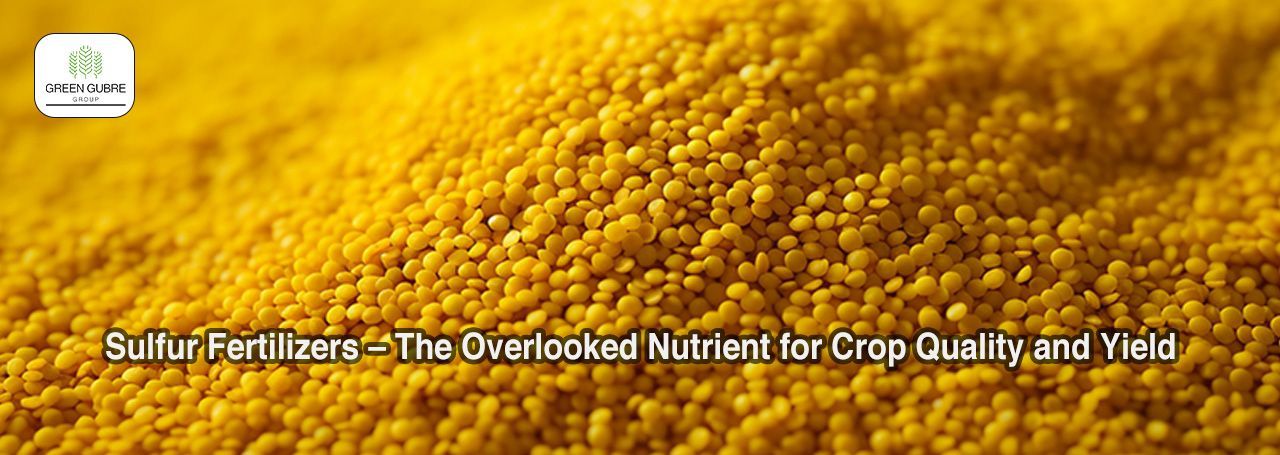Sulfur Fertilizers – The Overlooked Nutrient for Crop Quality and Yield
Sulfur Fertilizers – The Overlooked Nutrient for Crop Quality and Yield

Introduction: Sulfur’s Silent Role in Plant Nutrition
While nitrogen, phosphorus, and potassium dominate discussions about fertilizers, sulfur (S) is increasingly recognized as a critical fourth macronutrient. It plays a key role in protein synthesis, enzymatic activity, and chlorophyll formation. Sulfur deficiencies are rising due to reduced atmospheric deposition and intensified cropping, particularly in oilseeds, cereals, and legumes. Sulfur fertilizers can improve crop quality, oil content, and disease resistance—making them indispensable for balanced crop nutrition.
1. Why Crops Need Sulfur
Sulfur is essential for:
- Amino acids like cysteine and methionine (building blocks of proteins)
- Vitamins and enzymes that support plant metabolism
- Oil synthesis in crops like canola, sunflower, and groundnut
- Chlorophyll production impacts photosynthesis and plant vigor
Deficiency symptoms include yellowing of young leaves, stunted growth, and poor grain fill—often confused with nitrogen deficiency but appearing first in newer tissues.
2. Common Sulfur Fertilizer Products
Sulfur can be applied in various forms:
- Ammonium sulfate (21-0-0-24S) – a fast-acting N+S source
- Single superphosphate (SSP) – phosphorus plus sulfur for legumes
- Elemental sulfur – slow-release, used for pH correction and long-term S supply
- Gypsum (CaSO₄) – used in sodic soils for calcium and sulfur
- Polysulfates and thiosulfates – newer liquid and solid options for drip or fertigation systems
3. Sulfur-Responsive Crops and Regional Demand
Sulfur application is especially beneficial in:
- Oilseeds (Canola, Soybean, Sunflower) – boosts protein and oil content
- Pulses and Legumes (Chickpea, Lentil, Pea) – enhances nitrogen fixation
- Cereals (Wheat, Maize, Rice) – supports early vigor and grain development
- Vegetables (Onion, Garlic, Cabbage) – improves flavor, aroma, and shelf life
Countries such as India, Bangladesh, Canada, and Ethiopia have seen significant yield gains with sulfur fertilization, particularly in Sulfur-Deficient, high-yield zones.
4. Benefits Beyond Yield: Quality and Soil Health
- Increased Protein Content: Essential for bakery wheat and animal feed
- Enhanced Oil Content: Especially critical in mustard and rapeseed
- Disease Resistance: Sulfur boosts structural compounds that deter pathogens
- Soil Improvement: Elemental sulfur lowers soil pH and unlocks micronutrients
In regions using high-analysis fertilizers (urea, DAP) with no sulfur content, the yield response to sulfur is often dramatic.
5. Green Gubre Group – Sulfur Nutrition for Balanced Fertility
At Green Gubre Group, we support sulfur nutrition through:
- Granular and powdered ammonium sulfate
- Elemental sulfur and gypsum for soil conditioning
- Sulfur-enriched NPK blends for customized use
- Liquid thiosulfates for fertigation
- Soil testing and advisory to detect sulfur deficiencies
By restoring sulfur to the nutrient mix, we help farmers achieve better yield, quality, and crop resilience.



